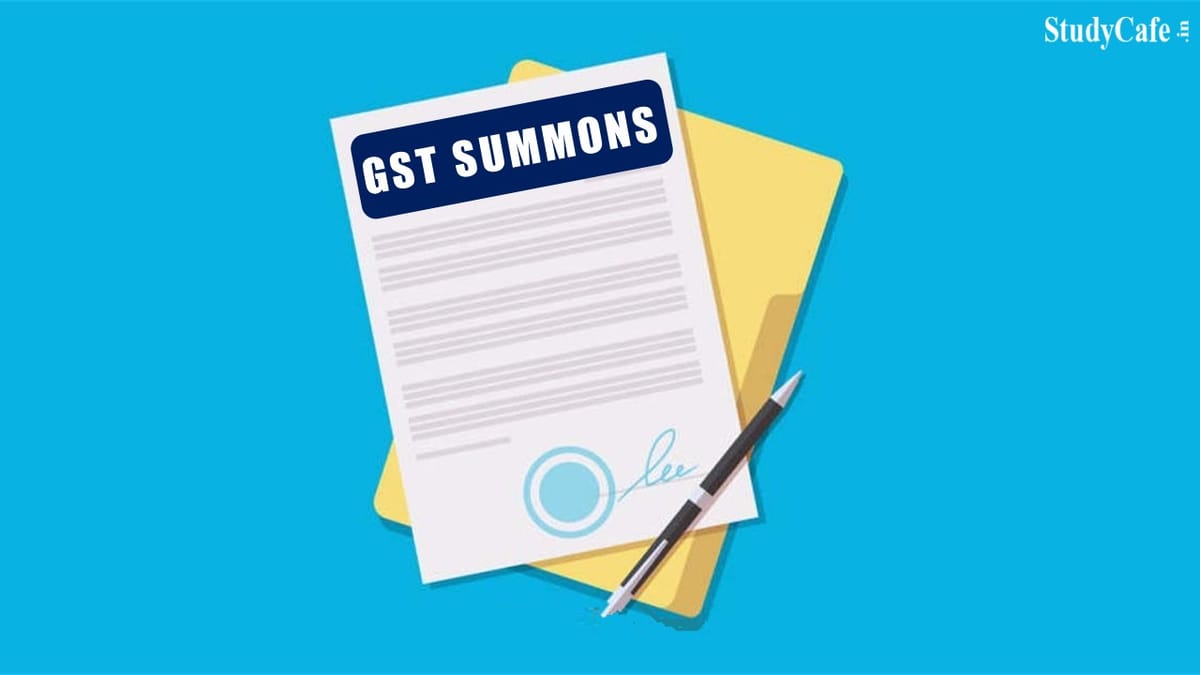Reetu | Aug 19, 2022 |

CBIC issued Guidelines on Issuance of Summons under Section 70 of Central GST Act 2017
The Central Board of Indirect Taxes and Custom(CBIC) has issued Guidelines on Issuance of Summons under Section 70 of Central GST Act 2017.
The Board has been informed that, in some cases, the field formations have routinely issued summonses under Section 70 of the Central Goods and Services Tax Act, 2017 (the “CGST Act”), to the top senior executives of the companies in order to request tangible proof or documents. Additionally, summonses have been issued to request statutory data such as GSTR-3B, GSTR-1, and other documents that are accessible online through the GST portal.
According to Section 70 (1) of the CGST Act, summonses may be issued by the proper officer to any person whose attendance is deemed necessary for conducting an inquiry or for providing testimony, producing documents, or doing anything else, in the same way that is permitted in civil cases under the Code of Civil Procedure, 1908. (5 of 1908). Securing such documentary and oral evidence in accordance with the aforementioned legal regulation shall be deemed to be “judicial procedures” in accordance with Sections 193 and 228 of the Indian Penal Code, as stated in sub-section (2) of Section 70. (45 of 1860).
While the Department can use summonses as one of its tools to find out about tax evasion, acquire information from anyone, or even get them to make statements, it is important to make sure that this authority is used sensibly and carefully. The use of letters for information requests in place of summonses is also encouraged for officers to consider in some circumstances. The Board has previously educated the officers about the importance of using the summons issue power responsibly in relation to legacy laws. However, the Board decides that new CGST regulations must be issued.
Following guidelines must be followed in matters related to investigation under CGST:
(i) Power to issue summons are generally exercised by Superintendents, though higher officers may also issue summons. Summons by Superintendents should be issued after obtaining prior written permission from an officer not below the rank of Deputy/ Assistant Commissioner with the reasons for issuance of summons to be recorded in writing.
(ii) Where for operational reasons it is not possible to obtain such prior written permission, oral/telephonic permission from such officer must be obtained and the same should be reduced to writing and intimated to the officer according such permission at the earliest opportunity.
(iii) In all cases, where summons are issued, the officer issuing summons should record in file about appearance/ non-appearance of the summoned person and place a copy of statement recorded in file.
(iv) Summons should normally indicate the name of the offender(s) against whom the case is being investigated unless revelation of the name of the offender is detrimental to the cause of investigation, so that the recipient of summons has prima-facie understanding as whether he has been summoned as an accused, co-accused or as witness.
(v) Issuance of summons may be avoided to call upon statutory documents which are digitally/ online available in the GST portal.
(vi) Senior management officials such as CMD / MD/ CEO/ CFO/ similar officers of any company or a PSU should not generally be issued summons in the first instance. They should be summoned when there are clear indications in the investigation of their involvement in the decision making process which led to loss of revenue.
(vii) Attention is also invited to Board’s Circular No. 122/41/2019-GST dated 5th November, 2019 which makes generation and quoting of Document Identification Number (DIN) mandatory on communication issued by officers of CBIC to tax payers and other concerned persons for the purpose of investigation. Format of summons has been prescribed under Board’s Circular No. 128/47 /2019-GST dated 23rd December, 2019.
(viii) The summoning officer must be present at the time and date for which summons is issued. In case of any exigency, the summoned person must be informed in advance in writing or orally.
(j) All persons summoned are bound to appear before the officers concerned, the only exception being women who do not by tradition appear in public or privileged persons. The exemption so available to these persons under Section 132 and 133 of CPC, may be kept in consideration while investigating the case.
(x) Issuance of repeated summons without ensuring service of the summons must be avoided. Sometimes it may so happen that summoned person does not join investigations even after being repeatedly summoned. In such cases, after giving reasonable opportunity, generally three summons at reasonable intervals, a complaint should be filed with the jurisdictional magistrate alleging that the accused has committed offence under Sections 172 of Indian Penal Code (absconding to avoid service of summons or other proceedings) and/or 174 of Indian Penal Code (non-attendance in obedience to an order from public servant), as inquiry under Section 70 of CGST Act has been deemed to be a “judicial proceedings” within the meaning of Section 193 and Section 228 of the Indian . Penal Code. Before filing such complaints, it must be ensured that summons have adequately been served upon the intended person in accordance with Section 169 of the CGST Act. However, this does not bar to issue further summons to the said person under Section 70 of the Act.
All of the field offices and formations under your supervision may be made aware of these instructions to ensure their full adherence. Instructions not being followed will be taken seriously. Any issues with the execution of the aforementioned directives may be brought to the Board’s attention.
In case of any Doubt regarding Membership you can mail us at [email protected]
Join Studycafe's WhatsApp Group or Telegram Channel for Latest Updates on Government Job, Sarkari Naukri, Private Jobs, Income Tax, GST, Companies Act, Judgements and CA, CS, ICWA, and MUCH MORE!"